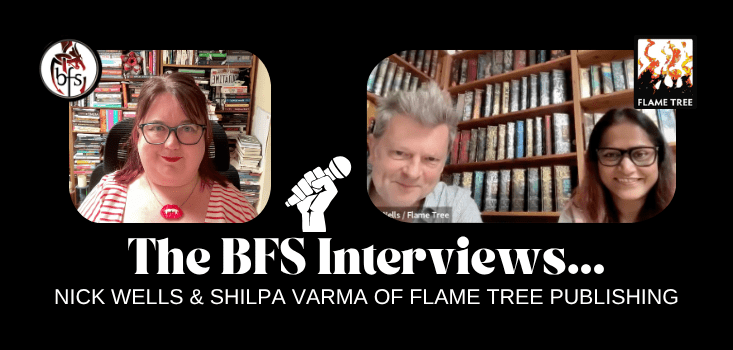In this first of an occasional—and hopefully more regular—series, Lauren McMenemy chats with Nick Wells, Publisher and Creative Director of Flame Tree Publishing, and writer Shilpa Varma, about the award-winning indie publisher’s new writer in residence programme, and about the importance of cross-border and cross-cultural storytelling.
You can watch the interview over on the BFS YouTube channel, also embedded here, or read the edited transcript below.
Nick, let’s start with you. Can you tell us a little bit about the idea behind this writer in residence initiative?
Nick Wells (NW): You tend to think of writers in residence and artists in residence in a more theatrical context, or an Arts Council type context. It can be a little bit elitist in the way that it operates. And I think one of the challenges that we face within publishing and as a publisher, is we have a series of bubbles—in my case, let’s say white, middle class maleness. So it’s a constant battle to really try to delve into the diversity of humanity.
We’ve published books on mythology and folklore in particular, and across fantasy, horror and science fiction, and we’re always seeking different ways of reaching a wider community, to seek voices and introduce those voices and mediate between voices and, really, to encourage self expression. So the writer in residence element has come out of that as a way of showing people that there are more than just opportunities to write things. We’re very keen to create excellence, let’s say, so it isn’t about tokenism, because that’s often a potential problem. It’s about creating a level playing field, giving access to everybody, but understanding different voices and in different places. A writer in residence is part of that attempt, one of many parts of attempts, sure, for that diverse storytelling.
You’ve mentioned diverse storytelling several times now, and that’s a really important part of the Flame Tree mission. So why is it that you want to really focus on elevating those voices?
NW: Well, really, on the evidence of the submissions that we get—apart from walking around in the everyday world—probably 95%, maybe more, of our submissions are from from middle class white people, and that’s partly because they know the game and know that they can spot something online in a particular place and follow the rules and apply. There is a danger that if you don’t know the rules of the game, or you’re not in that place, then you won’t submit. The world is full of great writers, and this is a problem.
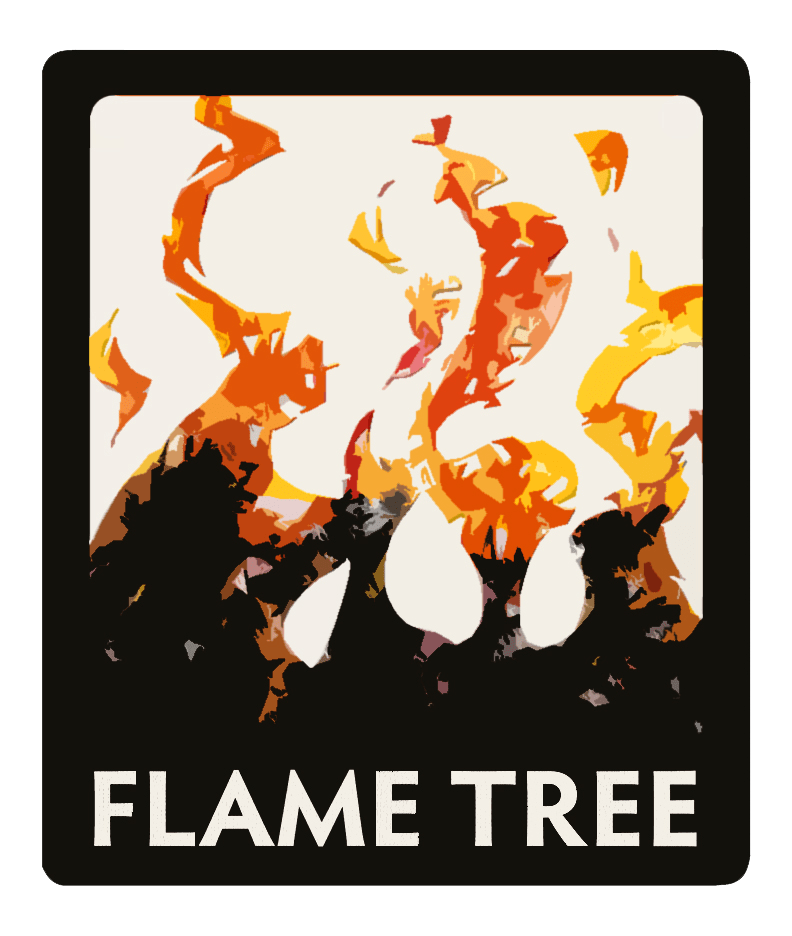
What we want to do is to find great writers in lots of different places and make equal judgments. So in the last few years, we’ve made particular attempts at publishing very specific sorts of books, like our African futurism volume. This year, we published a book by Amar Singh, who’s a Mumbai resident. And we’ve done a lot of work in China, and a lot of it is because once you start to talk to people from other cultures, you see yourself in a different way, and that’s very, very important. So it’s about creating that level playing field, trying to constantly challenge the way we think, because that is a creative endeavor in its own right.
Why did you choose Shilpa for the first writer in residence at Flame Tree?
NW: Shilpa is interesting, not simply because she’s from a diverse background, which is—I won’t say incidental—but it’s actually her theatrical background, which is particularly interesting because it is different. One thing that’s very important these days is trying to reach people of different ages and different backgrounds, and just putting a printed object in front of some people is actually slightly alienating. Sometimes it might lead us to thinking that, say, younger generations or different people, or people from the theatre or the filmmaking world aren’t dealing with the written word. Well, of course, they’re dealing with language and self expression manifests in many, many different ways. Shilpa’s theatrical background is very, very important to that, because in the theater, you distill the language to a great extent, because you’ve got this other experience around you. So when you’re writing a script for that sort of thing, you have to know the audience is going to be seeing what else is going on, and that that forces the writing in a different direction. So that was very important to us.
We’ll talk a little bit more at the end about the future for this initiative and what sort of things you want to be doing, but for this first engagement, what would you like Shilpa to be doing? What’s her remit?
NW: It’s a 12 month remit, and it’s now integrated into, actually, the next stage of how we want to do things, which is we’re moving into a series of workshops and mentorship programs, which follows on from having a writer in residence, which allows us to think that way. Shilpa is going to be organizing a lot of that, and it’s useful that a writer is organizing that, not just someone who’s sort of, I won’t say pushing writers around, but it’s always helpful to have someone who understands what’s going on. The output is very much contributing work, which, incidentally, is Shilpa’s copyright. Any work that the writer in residence does under this guise has been encouraged and sponsored by us, if you like, but it is their copyright. We want to see that manifesting, let’s say, in the podcast, maybe an audio drama, in printed short fiction, in ebook form, we might have poetry slams. We hope through the workshops and the mentorship program, we just try different sorts of things, to try and encourage people to see things in a different way and think that, well, maybe they should have a try. The emphasis is on their expression.
Shilpa, what attracted you to want to be the writer in residence for Flame Tree?
Shilpa Varma (SV): It’s not just a writer in residence. The brief was very specific because it talks about perspective more than anything else, and the perspective that I bring on board for who I am, where I belong to, and, of course, my experience in theatre. So I couldn’t have asked for anything better, to be honest, because I think any writing that you do is always about who you are and where you have been and this position encouraged that.
Can you talk us through a bit about your journey with creativity, and all of these amazing things that you’ve done?
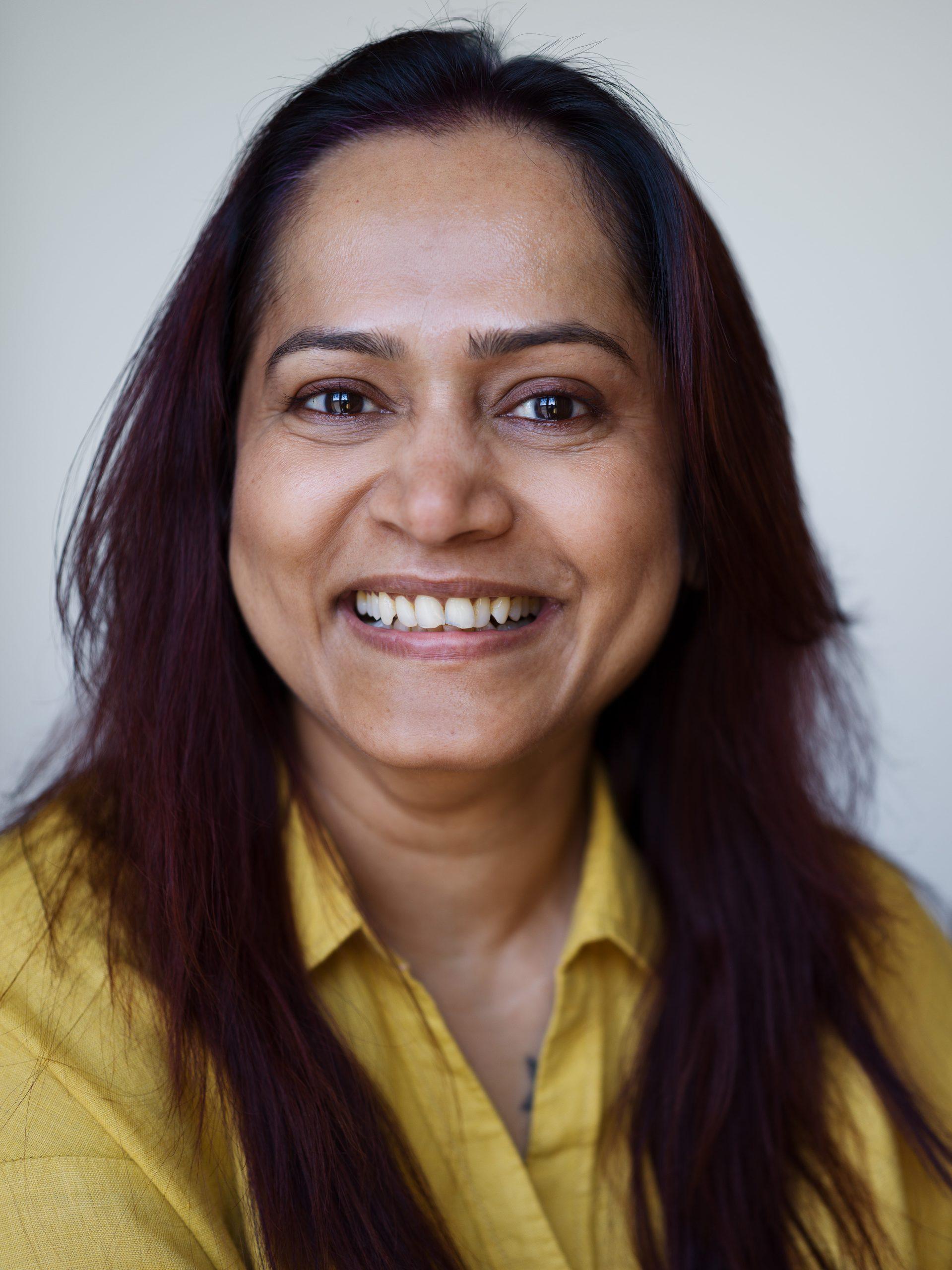
SV: I was with Cartoon Network India, heading their animation production for local animation. And then I jumped to Walt Disney India and did the same thing. So it was lovely. We were making cartoons, it’s a fun job, you know, talking to kids. But the very important lesson that I learned there is, even though the target audience was kids, you talk to them, never down to them. So that is something that I always carry with me as a writer or or a performer. Then in 2019 I was, like, that’s too many years in the corporate world, and I needed to do something else. Acting happened, and I wanted to invest in the craft, and that’s why I shifted to London to study acting. So I’ve done my masters with Drama Studio London, and I write my own one woman plays, and I’ve been performing them, and then I write here at Flame Tree. All along with being a mum, a daughter, and a wife.
(Pictured: Shilpa Varma)
How important is that cross cultural storytelling to you as a South Asian creative?
SV: I would say it’s as important as it should be for anybody else. If I just want to talk about being a South Asian writer and things from that perspective—there’s more to South Asians than Bollywood and mythology. It’s high time we started looking at each other from a different lens. It’s nice to get to know us, and we’re getting to know you kind of a thing.
You’re exploring that in the blog series you’re writing as well, called Between Worlds. What really stands out for you as you navigate that divide, as you live between worlds as a creative?
SV: It’s like living in and experiencing two different worlds as a person. That’s very interesting. And then, you know, when you want to talk about it, you don’t have to struggle to write. What’s interesting is very little everyday things, like, the first time I was here and queuing behind people, and people are just waiting patiently. I don’t know if I would have done that in India—someone would have just jumped the queue. And personal things like, my son turned 18, and his was such a quiet birthday, and I did not even realize in India it would have been such a big deal—the family coming over, and what is he going to do? So everything in India is for everybody else, nothing is your personal thing. These tiny, simple things about everyday—the weather, we don’t talk about weather at all in India. When it rains, it rains. It’s never like a drizzle or pouring, or, I don’t know too many words you guys use for different kinds of rains here.

And about the culture of publishing—before coming here, I had never seen so many libraries. To be honest, there are libraries in India, but here you do not have to travel far to be in a safe space where you can read, talk about books. It happens in India. I’m not saying it doesn’t, but it’s not as much as it should be. Books for us are like, it’s something that you really can’t touch it with sticky hands, or you just keep looking at it. And you have to think before doing anything with the book. Here, you actually live with the books. They can be on your bed, one in the toilet if you want to read there. Indie publishing is happening more here, which I really thought should happen more, though something that can be done more is translations. But here, like at Flame Tree, we are doing so many anthologies from different parts of the world. And Nick just showed me the Ramayana that they did, which is like the epic for us. So things like these, the cross-border, cross-pollination, happening, publishing, is eye opening. I’m very happy to be to be a part of that.
What is the publishing world like in India?
SV: There are publication houses and indie publishers, but what is not happening is the number of readers. I think that the number of readers is not going up, especially in small towns.
I think the children are not conditioned to read, per se, because books are expensive. It’s only the upper middle class which is investing in books. And because of that, maybe—I don’t know what the reason is—but reading is not happening as much, and that’s why I think there’s not many publications, or not many books, as the population of India needs.
(Photo by Vantage Point Photographers on Unsplash)
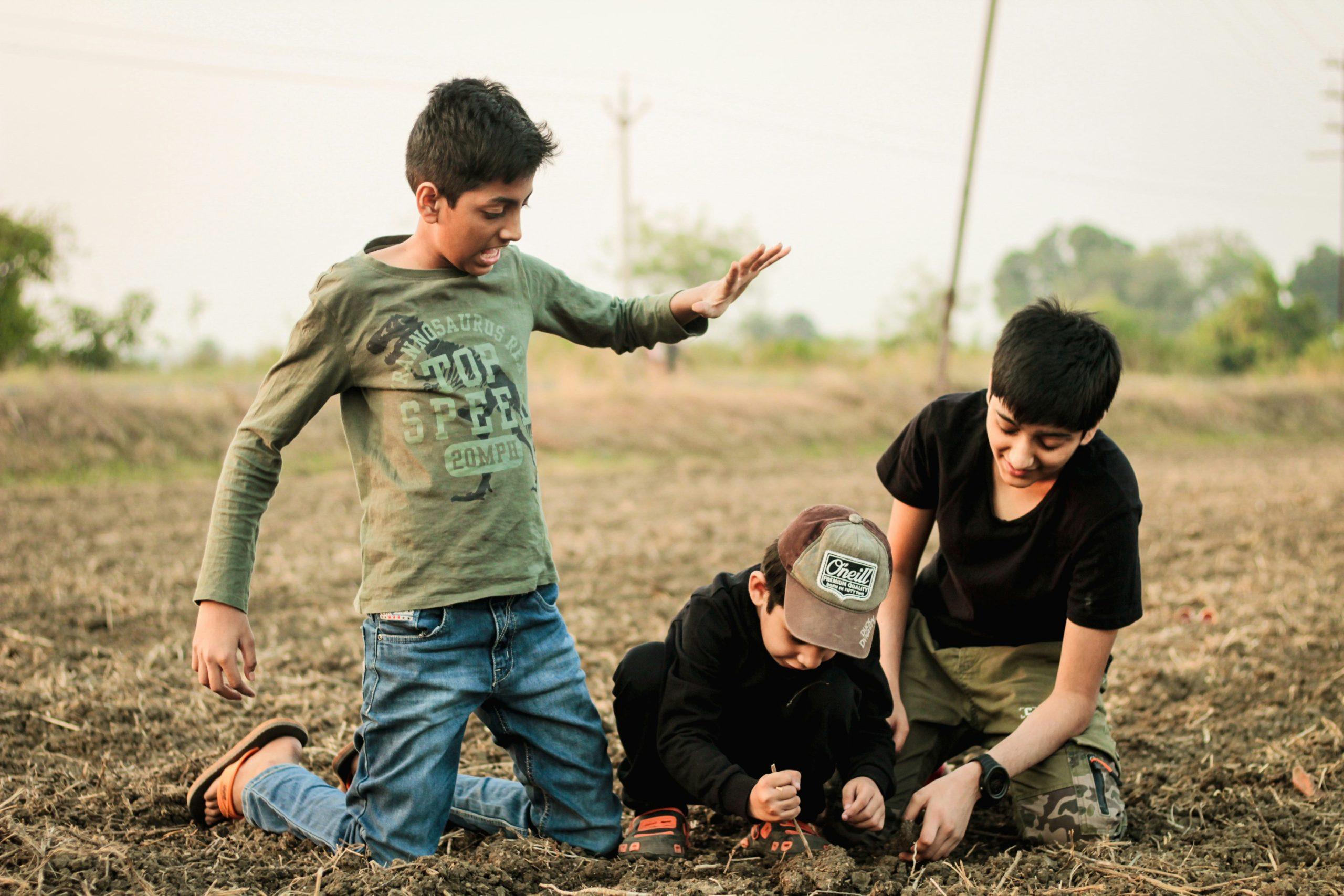
And also our old Hindi authors—there are not too many Hindi books which are now being published, very few. And it’s sad to see that the, you know, regional languages or the are not giving, not being given that much importance.
What is the speculative fiction world like in India?
SV: I think it’s only happening online; like, I’ve seen mostly the young adults going for it than the older generation. Have I seen the books in a physical format? I’m trying to think now it’s more what the kids, when they talk to each other—and that’s mostly online—it’s what they can find to read rather than a physical book in hand. But having said that, it is picking up. It is growing.
NW: Just to interject very slightly from the outside perspective, I would say science fiction and fantasy is very tentative as a focus. Alan Stroud, the former of the British Science Fiction Association chair and a friend of all of us here, he’s put me in touch with a group of science fiction writers in India. There is a group, and it has that sort of underground feel to it, because they are so tentative. They’re not used to the nurturing that one has through a society like British Fantasy Society. So it’s very, very different. And in fact, in China, it’s different again, because in China, science fiction has a respectability, but it’s entirely attached to universities and academic institutions in order to survive at all. So it has a very, very different perspective there, but it’s actually very, very big in China now—in the cities, but not in the countryside.
Shilpa, one thing I personally wanted to ask you about: I read that you’re doing a folk horror audio mini series as part of this remit. That’s my thing; I’m a folk horror person. Can you tell us a little bit about that project?
SV: I was in India a couple of months back, and Nick and I were talking about folk horror. He really wanted to do something about it. So this one that I’m writing, it’s based on a mythological god in a tribal area of India, which is Bastar, and there’s this group of people who worship him. The stories that I heard were very different from the other gods in mythology; this is a lesser known god, maybe only restricted to that part of the country. So it’s based on that. A group of Westerners want to film about this god, they go to this tribal area, and then what happens? How? What does the god want from them? I have tried being true to the original in a sense. I’ve tried using the sounds or the landscape or the birds, flora, fauna that is found there.
NW: I particularly love the depiction of stumbling, stumbling Europeans very loudly with their misconceptions and stereotypes. The ring is horribly true.
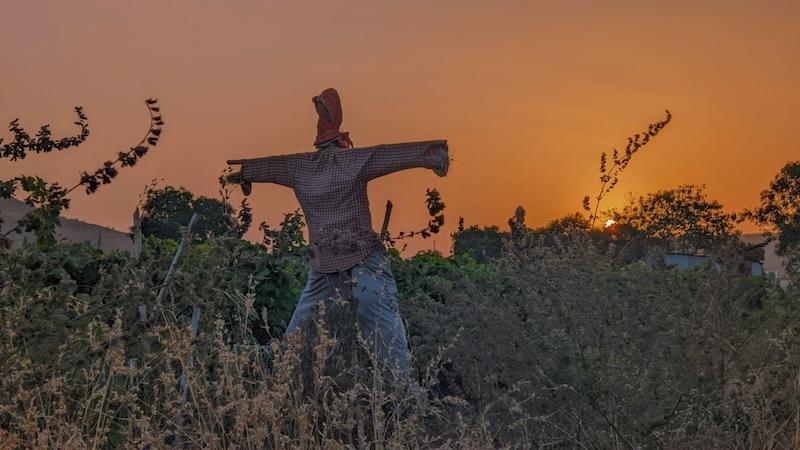
One of the reasons I’m particularly interested in folk horror is the folk bit. The everyday bit of our past is very present in us today, in a way that’s often suppressed. So there is a fascination with gods, but really the gods and the mythologies were places where humans are the playthings of the gods and are at the mercy of the gods. But once you start going down to the folk horror, there’s this sort of ancient battle of of humanity and dread and fear as it tries to cope with the world and getting around and trying to make the best of the world. I think there is a lot of good horror, well, let’s say dark fantasy, which can be derived from many, many different traditions around the world. We’re doing a book called Latin American Shared Stories with a V Castro at the moment, which is a collection of short stories from many, many different countries, and they all are completely different from each other—a little bit like India actually. We tend to think of South America as this conglomerate, but actually it has many, many different regions and countries, and India is full of many different emphases. So I think the more we learn about those differences, and are interested in them, explore them, the more it obviously tells us about ourselves, amd makes us think about what’s going on in the world.
This is obviously such an important and fruitful partnership already. But what are you both hoping to achieve from it?
NW: I think visibility—not for Flame Tree, but of a thing which needs to be highlighted, which is self expression and creativity in its many different forms, so that we can move on to do these other things I was talking about earlier, which is workshops and mentorship programs while creating excellence. Tokenism is the enemy of expression, in many ways, because it creates an anti-bias when in fact, what we need to do is facilitate people’s expression and creativity. And I very much see this role as doing that and allowing us to move on to other things.
SV: And also, as Nick mentioned, the mentoring other writers and looking for different perspectives from different people. I think that’s what both of us want to do together. That’s very important. It allows us to explore storytelling in its many, many different forms.
You’ve alluded to it quite a bit already, Nick, but the official question to you now, what is next for the writers in residence program? What else are you looking to do as you support and encourage this self expression?
NW: Well, we are setting up a series of workshops. We will be taking space in a local art centre in London, and it’s deliberately designed to be close to a train station so that we can both work locally, which we’ve never really done before, because in London, in Hammersmith and in Putney, there are lots of people. It’s not just full of rich middle class Londoners; it’s full of people who have no other outlet necessarily to explore themselves. So we will be setting up for these workshops, and our intention, very much, is to explore the diversity of opinion and background and allow people to express themselves in a way which works for them. Some people are exposed to film and only film, and so they actually think in those kinds of filmic terms and that’s it. But 100 years ago that didn’t exist, but it is still a form of self expression and still a form of language. A lot of this is about language and storytelling.
The mentorship program as part of this is very important, because it aims to guide people. There’s a lot of people feeling frustrated about not being published—but then, all writers feel that; we’re not alone. I used to be told that you’d be lucky to get published once in 10. I think it’s more like once in maybe 30 now, if you’re really lucky, because there’s so many people doing it, and that’s actually that, in itself, is a community of people trying to make things work. But of course, you’ve got to be able to write to a standard to even be considered, maybe to be turned down, or to be redirected. Some people are turned down because there are five other stories which are on the same subject, and that’s not necessarily obvious. So just passing on that sort of knowledge is going to be very important, and over the next six to six to 12 months, those are the sort of programs that we’ll be developing.
How can people follow what’s going on?
NW: Well, blog.flametreepublishing.com/blog is where we have our main blogs, and flametreepublishing.com is where we advertise on the homepage for all the new events. I think we’re probably getting better at social media, because it changes every five seconds. So we will be pushing out on social media, but we’re always trying to find new places, Discord, Reddit communities, where different people communicate. And they can join our newsletter, so every month they would know what’s coming up, new submissions and stuff.
SV: I’m there as Flame Tree, of course, but as an actor like I have my instagram @theshilpavarma, if anyone is interested in knowing what I am acting for.
Is there anything else you want to tell us or the community about what’s going on in your worlds?

NW: The only thing I will say is that the one area we slightly ignore sometimes in this kind of conversation, is the importance of our journals. We make beautiful journals (some are pictured). And the thing about journals is that they’re very good for writing. They’re very good for poems, and they’ll have lots of different designs. And we have many, many different sizes of journals, and I have an embarrassing number, which I use for my work, I have a journal for music, I have a journal for other creative stuff. It’s a different form of expression, but it all unites in this storytelling.

